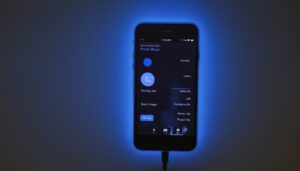Is Your Phone Making You Fat? The Alarming Link Between Tech and Weight Gain
In our fast-paced, technologically driven world, smartphones have become an integral part of our daily lives. While these devices offer convenience and connectivity, there’s a growing concern about the impact they may have on our physical health, specifically in relation to weight gain. In this article, we’ll explore the alarming link between technology and weight gain, shedding light on the reasons behind this phenomenon and providing practical tips for maintaining a healthy balance.
Table of Content:
- Introduction
- The Technological Revolution
- The Weight Gain Dilemma
- How Phones Contribute to Weight Gain
- The Role of Blue Light
- Social Media Influence
- Tips for a Healthier Tech-Lifestyle
- Technological Solutions
- Balancing Act: Tech and Health
- Real-life Success Stories
- Future Trends in Tech and Health
- Reader Engagement Section
- Conclusion
- FAQs
I. Introduction
- Brief overview of the topic
The pervasive use of smartphones in modern society has raised questions about their potential role in the rising rates of obesity.
- Importance of addressing the issue
Understanding the connection between technology use and weight gain is crucial for promoting healthier lifestyles and mitigating the adverse effects on our well-being.
II. The Technological Revolution
- Impact of technology on daily life
The technological revolution has transformed the way we live, work, and communicate, bringing unprecedented convenience to our fingertips.
- Rise of smartphones and their omnipresence
Smartphones, in particular, have become ubiquitous, accompanying us in almost every aspect of our lives.
III. The Weight Gain Dilemma
- Statistics on increasing obesity rates
Recent statistics highlight a concerning global trend of increasing obesity rates, prompting a closer look at potential contributing factors.
- Connection between technology usage and weight gain
Studies suggest a direct correlation between excessive technology use, particularly smartphone usage, and the rise in obesity.
IV. How Phones Contribute to Weight Gain
- Sedentary lifestyle and screen time
Extended periods of screen time often translate to a sedentary lifestyle, contributing to weight gain and related health issues.
- Mindless eating and distraction
The constant distractions provided by smartphones can lead to mindless eating, as individuals may consume more calories while engrossed in their screens

V. The Role of Blue Light
- Explanation of blue light effects
Blue light emitted by screens can disrupt sleep patterns and potentially affect metabolism, influencing weight regulation.
- Disruption of sleep patterns and its impact on weight
Poor sleep quality, often linked to prolonged screen exposure, can interfere with the body’s natural processes for weight management.
VI. Social Media Influence
- Comparison culture and body image issues
The pervasive nature of social media exposes individuals to unrealistic body standards, contributing to body image issues and unhealthy habits.
- Stress and emotional eating triggered by social media
The constant connectivity of social media may induce stress, leading to emotional eating and, subsequently, weight gain.
VII. Tips for a Healthier Tech-Lifestyle
- Setting screen time limits
Establishing and adhering to reasonable screen time limits can help mitigate the negative effects associated with prolonged use.
- Incorporating physical activity into daily routine
Integrating regular physical activity into daily life can counteract the sedentary nature of technology use.
- Mindful eating habits
Practicing mindfulness during meals and avoiding distractions can promote healthier eating habits and prevent overconsumption.
VIII. Technological Solutions
- Fitness apps and their benefits
Fitness apps can serve as valuable tools, encouraging users to stay active and monitor their progress towards fitness goals.
- Gadgets promoting an active lifestyle
Innovative gadgets, such as fitness trackers, smartwatches, and interactive home workout equipment, offer convenient ways to maintain an active lifestyle.

IX. Balancing Act: Tech and Health
- Importance of moderation
Emphasizing the importance of moderation in technology use is key to achieving a balanced and healthy lifestyle.
- Finding a balance between technology use and well-being
Striking a balance between reaping the benefits of technology and prioritizing one’s health is crucial for long-term well-being.
X. Real-life Success Stories
- Examples of individuals who improved health by reducing tech time
Highlighting real-life success stories can inspire readers to take steps towards a healthier tech-lifestyle.
- Inspirational anecdotes
Sharing anecdotes of individuals who successfully navigated the challenges of excessive technology use and achieved weight management goals.
XI. Future Trends in Tech and Health
- Innovations promoting a healthier lifestyle
Exploring upcoming technological innovations aimed at promoting healthier living and addressing the challenges posed by current technology trends.
- The role of technology in combating obesity
Examining how future advancements in technology can contribute to combating the global obesity epidemic.
XII. Reader Engagement Section
- Encouraging readers to share their experiences
Inviting readers to share their own experiences, challenges, and successes in managing their tech usage and weight.
- Inviting comments and suggestions
Encouraging readers to leave comments and suggestions for fostering an interactive community around the topic.
XIII. Conclusion
- Recap of key points
In conclusion, the undeniable link between technology and weight gain necessitates a mindful approach to our digital lifestyles.
- Encouragement for readers to adopt a healthier tech-lifestyle
Encouraging readers to implement the tips discussed and strive for a healthier balance between technology use and overall well-being.
XIV. FAQs
- How much screen time is considered healthy?
Maintaining a healthy balance typically involves limiting screen time to 2-3 hours per day, excluding work-related activities.
- Can using fitness apps really make a difference?
Yes, fitness apps can be effective tools, providing guidance, tracking progress, and motivating individuals to stay active.
- Is all blue light harmful to our health?
While prolonged exposure to blue light at night can disrupt sleep, not all blue light is harmful. Daytime exposure can have positive effects on mood and alertness.
- Are there any specific gadgets recommended for weight loss?
Fitness trackers, smart scales, and interactive workout equipment are popular gadgets that can aid in weight loss and overall fitness.
- How can social media positively impact our well-being?
Using social media mindfully, fostering positive connections, and engaging in uplifting content can contribute to improved mental well-being.




